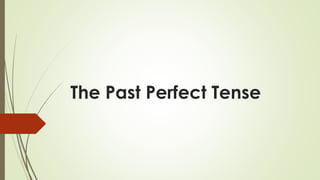
Past perfect tense x past perfect continuous
- 1. The Past Perfect Tense
- 2. Form: The Affirmative - make it with 'had' + the past participle of the main verb I had been (I'd been) You had gone (you'd gone) She had met (she'd met) He had played (he'd played) It had rained (it'd rained) We had bought (we'd bought) They had studied (they'd studied)
- 3. Attention!!!!! (The short form for 'had' is 'd. ) Be careful not to confuse it with 'would'. Would is followed by the infinitive - 'I'd go', whereas had is followed by the past participle - 'I'd gone').
- 4. For the negative just add 'not': I had not been (I hadn't been) You had not gone (you hadn't gone) She had not met (she hadn't met) He had not played (he hadn't played) It had not rained (it hadn't rained) We had not bought (we hadn't bought) They had not studied (they hadn't studied)
- 5. And to make a 'yes / no' question put 'had' before the subject: Had I come? Had you eaten? Had she gone? Had it rained? Had he studied? Had we met? Had they left?
- 6. For 'wh' questions put the question word at the beginning: When had I come? Why had you eaten? Where had she gone? When had it rained? Why had he studied? How had we met? When had they left?
- 7. Use: 1: A completed action before something else in the past. When we arrived, the film had started. (= first the film started, then later we arrived)
- 8. 2: To explain or give a reason for something in the past. I'd eaten dinner so I wasn't hungry. It had snowed in the night, so the bus didn't arrive.
- 9. 3: To indicate something that started in the past and continued up to another action in the past. When he graduated, he had been in London for six years. (= he arrived in London six years before he graduated and lived there continuously until he graduated, or even longer)
- 10. 4: As part of the third conditional. If I had known you were ill, I would have visited you.
- 11. The Past Perfect Continuous
- 12. Form Here's how to make the past perfect continuous. It's 'had' + been (the past participle of 'be')+ main verb-ing
- 13. Affirmative form: I had been living You had been going She had been sleeping He had been working It had been raining We had been studying They had been cooking
- 14. Attention !!!!!! The short form is: 'd been verb-ing. Be careful, because the short form for 'would' is also 'd. However, 'would' is always followed by the infinitive, but 'had' is followed by the past participle.
- 15. Negative form: I had not been trying (I hadn't been..) You had not been working (you hadn't been..) She had not been crying (she hadn't been..) He had not been shopping (he hadn't been..) It had not been snowing (it hadn't been..) We had not been reading (we hadn't been..) They had not been running (they hadn't been..)
- 16. Yes / No Question form Had I been working? Had you been sleeping? Had she been reading? Had he been watching TV? Had it been raining? Had we been drinking? Had they been eating?
- 17. Wh' questions: Where had I been working? How long had you been sleeping? What had she been reading? How long had he been watching TV? How long had it been raining? What had we been drinking? Why had they been eating?
- 18. Use: 1: Something that started in the past and continued up to another action or event (tells us 'how long') She had been working at that company for a year when she met James. (This tells us how long something had continued before another event in the past.
- 19. 2. Cause of something in the past The pavement was wet, it had been raining. (It was raining before the time I'm describing in the past. We could see the result of the rain.
- 20. By teacher Adelaide Aparecida
